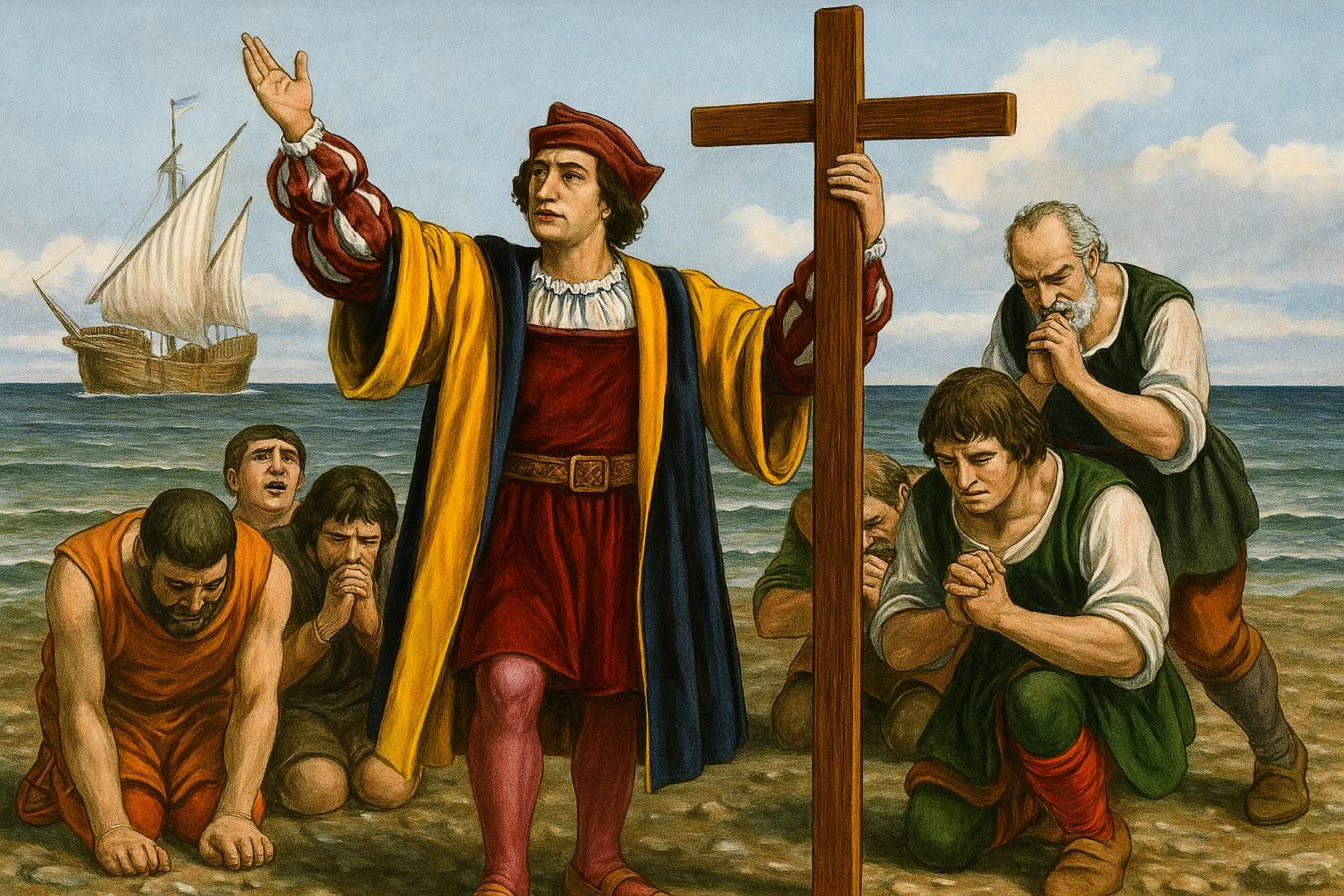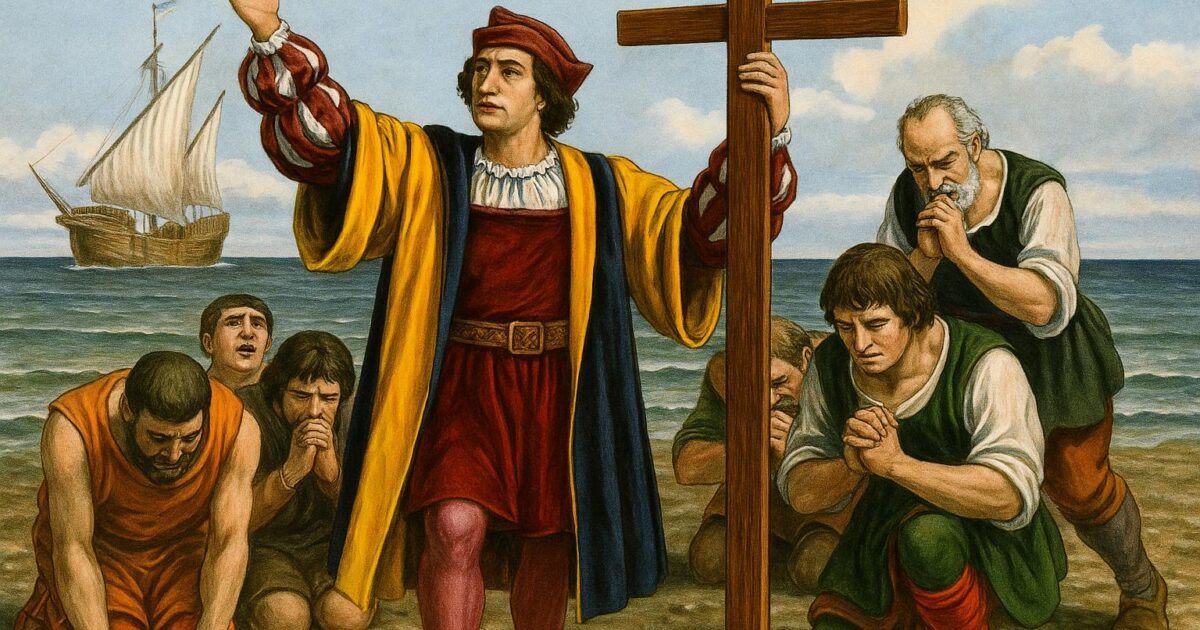This post was originally published on this site

President Donald Trump, in his October 9, 2025 White House Proclamation, wrote, “Today our Nation honors the legendary Christopher Columbus, the original American hero, a giant of Western civilization, and one of the most gallant and visionary men to ever walk the face of the earth.” The proclamation officially designates Monday, October 13, 2025, as Columbus Day, making it the only official holiday in October and effectively removing Indigenous Peoples Day from federal recognition.
Columbus Day has been a federal holiday since 1934 and was never abolished, but Trump’s action signaled that his administration will no longer recognize Indigenous Peoples Day. That observance had been introduced by President Biden in 2021, when he became the first U.S. president to issue a proclamation recognizing Indigenous Peoples Day alongside Columbus Day.
When President Trump signed the declaration, he announced, “We’re back, Italians,” during a Cabinet meeting at the White House. The proclamation described Christopher Columbus as “a true American hero,” directly rejecting efforts in recent years to replace the holiday with Indigenous Peoples Day.
President Trump’s 2025 Columbus Day Proclamation honors Christopher Columbus as “the original American hero, a giant of Western civilization,” and pledges to “reclaim his extraordinary legacy of faith, courage, perseverance, and virtue from the left-wing arsonists who have sought to destroy his name.”
The document recounts Columbus’s 1492 voyage, highlighting his faith and courage in spreading “the Gospel of Jesus Christ to distant lands,” and recalls the symbolic moment when he “planted a majestic cross in a mighty act of devotion, dedicating the land to God and setting in motion America’s proud birthright of faith.”
During a Cabinet meeting at the White House, Trump emphasized that “those days are finally over,” referring to what he called left-wing attempts to “erase our history” by tearing down Columbus statues and condemning his legacy. White House staff secretary Will Scharf described Columbus Day as an important tradition for Italian Americans, honoring his spirit of exploration and innovation.
Trump’s proclamation and his remarks at the White House meeting, met with applause from Cabinet members and was particularly welcomed by Italian-Americans. The statement honored Italian-Americans and the deep cultural bond between the United States and Italy, rooted in “faith, family, and freedom.” Concluding on a nationalistic note, Trump urged Americans to “restore a Nation that once again dares to tame the unknown, honors our rich cultural inheritance, and offers rightful praise to our Creator above.”
The National Italian American Foundation (NIAF) issued a statement praising President Trump for restoring Columbus Day to national prominence. NIAF President and CEO Robert Allegrini commended Trump’s “commitment to preserving and enhancing the celebration of Columbus Day,” describing it as vital to both Italian American heritage and the nation’s shared history. For decades, NIAF has fought to protect Columbus Day and related monuments from efforts to diminish their importance.
The organization reaffirmed that these symbols represent “the spirit of exploration, courage, and cultural exchange that Columbus represents.” Allegrini added that NIAF is “grateful for the President’s strong support.”
The celebration of Columbus Day has long been tied to Italian American identity, honoring more than 16 million Americans of Italian heritage and the generations who helped shape the nation. The tradition began in 1892, when President Benjamin Harrison declared the first national Columbus Day celebration to ease tensions after the 1891 New Orleans lynching, in which a mob killed 11 innocent Italians, the largest mass lynching in U.S. history.
The massive parade that followed in New York City drew more than a million people. In 1934, President Franklin D. Roosevelt made Columbus Day a federal holiday, cementing it as a lasting tribute to Italian American pride and contribution.
Today, that legacy continues with the annual New York City Columbus Day Parade, organized by the Columbus Citizens Foundation and recognized as the nation’s largest celebration of Italian American heritage and the largest ethnic parade in the United States. Each year, more than 20,000 participants march through Manhattan, while hundreds of thousands line the streets to display Italian American pride and honor the enduring legacy of Columbus.
Native American leaders and advocates expressed disappointment and concern over Trump’s Columbus Day proclamation. Former Navajo Nation President Jonathan Nez said Trump’s actions “just take us back in time, to a time where Indigenous peoples were not respected and were not seen as human beings.” Apparently, being “seen as human” now requires having their recognition day fall on Columbus Day.
Over 200 cities and several states have replaced Columbus Day with Indigenous Peoples Day. By liberal logic, this must mean they view Italian Americans as not “seen as human.” States and cities that have dropped Columbus include Maine, Vermont, New Mexico, Washington D.C., Los Angeles, and Seattle. Maine, Vermont, New Mexico, and D.C. now officially recognize only Indigenous Peoples Day, while Nebraska, Pennsylvania, and Rhode Island observe both holidays. California and Maine have reaffirmed their commitment to Indigenous Peoples Day, and cities such as Los Angeles, Seattle, and Minneapolis continue to hold events in October despite Trump’s federal proclamation restoring Columbus Day. Berkeley, California, which first adopted Indigenous Peoples Day in 1992, still hosts its annual powwow and festival, showing how deeply the shift has taken root.
Anyone dismissing Columbus is missing the point. The reason we have to have Columbus Day is because, as Tony Soprano said, “He was a great Italian explorer! And in this house Christopher Columbus is a hero! End of story!”
The post Trump’s Columbus Day Proclamation – End of Woke, Celebrates Discoverer of America, Restores Italian-American Pride appeared first on The Gateway Pundit.


